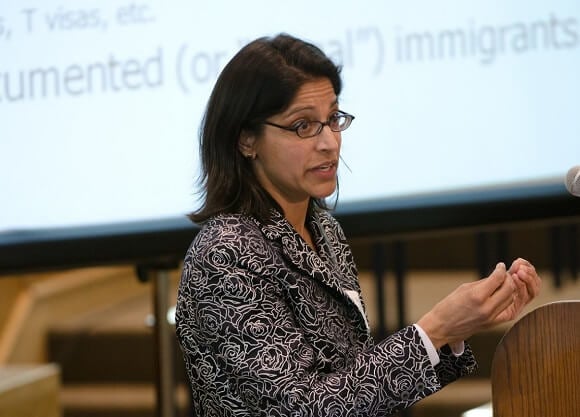
School of Law training combats human trafficking
July 03, 2017

July 03, 2017

Hayre has been more than a bystander in the state’s fight against what has outpaced gun and drug smuggling as the world’s fastest growing illegal industry. She is one of the chief architects of Quinnipiac Law’s human trafficking project, a student-designed training program that educates hospitality workers on how to identify and report potential cases, and that fosters strong, open communication with law enforcement and other entities.
“We are truly leading the charge here in Connecticut,” Hayre said. “Many states around us are actually asking for guidance on how to develop their own programs.”
While many wouldn’t think of Connecticut as a hotbed for the crime, it has experienced a significant uptick in the last several years, particularly with regards to child-sex trafficking. This prompted legislators to pass Public Act 16-71 in May 2016, making Connecticut the first state to require all hospitality and lodging workers to receive training on human trafficking response.
“Some statistics suggest that one in every three runaways will be approached by a trafficker within 48 hours,” Hayre said. “They are preyed upon because they are so young and vulnerable.”
The human trafficking project, made possible by a coalition with the Grace Farms Foundation in New Canaan, Connecticut, a nonprofit that provides educational services for justice initiatives, has already helped numerous hospitality employers, and will host its largest training session to date later this month.
“People always ask ‘why hotels’?” Hayre said. “It’s because they are anonymous and transitory, making it easier for traffickers and ‘clients’ to conduct their business and quickly move on.”
Hayre shared strategies and solutions with panelists and frontline allies in the fight against human trafficking, including representatives from Connecticut’s Human Anti-Trafficking Response Team, and Love 146, a nonprofit international human rights organization dedicated to the abolition of child trafficking. They also discussed several major obstacles they still face when fighting trafficking, from predatory internet sites that vet and sell children to the ongoing psychological trauma that victims suffer.
“In my experience, it can be very difficult to work with victims,” Hayre said. “Many times, these kids don’t even view themselves as victims, and actually identify with their trafficker.”
Hayre sees collaboration as a way to combat these challenges, and hopes to partner The Human Trafficking Project with national initiatives, including the Department of Homeland Security’s Blue Campaign.
“We definitely want to expand this to include lawyers, businesses and as many other agencies as possible going forward.”
To help raise awareness about human trafficking in Connecticut, visit the Blue Campaign and Grace Farms Foundation — and include #QUImpact in your conversation.
Quinnipiac Today is your source for what's happening throughout #BobcatNation. Sign up for our weekly email newsletter to be among the first to know about news, events and members of our Bobcat family who are making a positive difference in our world.
Sign Up Now